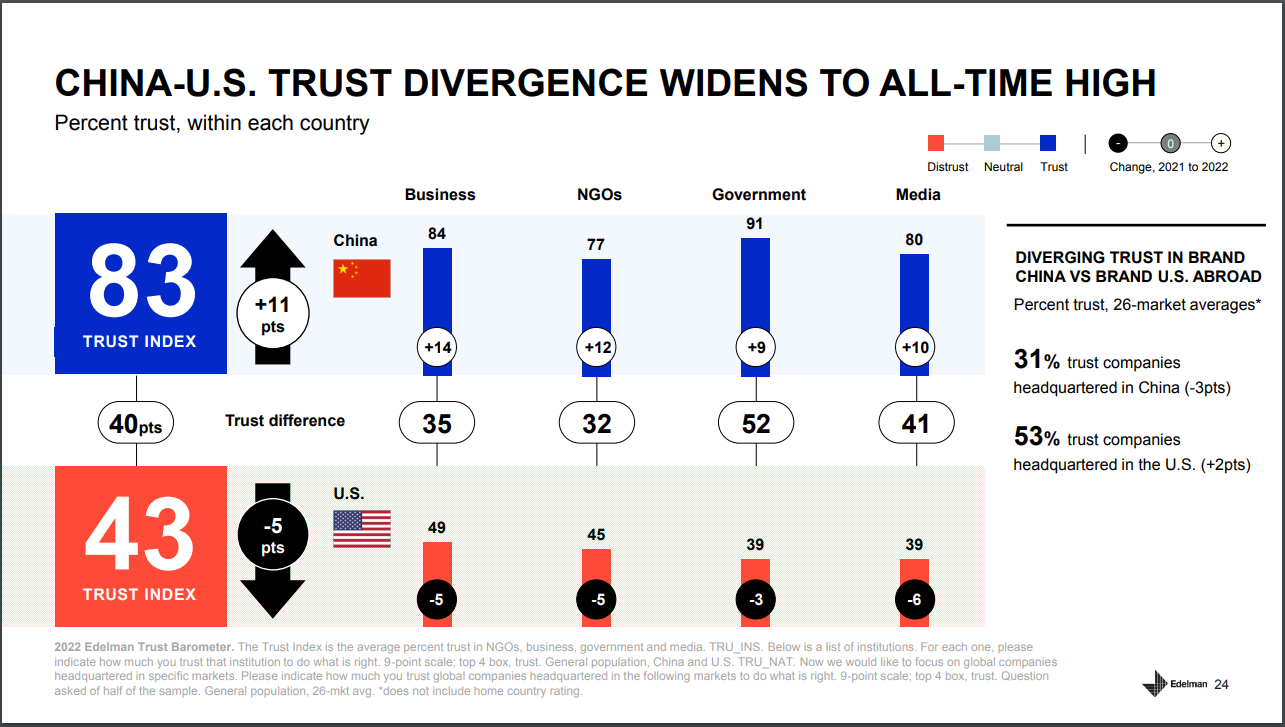
The cover of the Edelman Trust Barometer 2022. [Screenshot via Edelman.com]
By Alexander Ayertey Odonkor
Prior to the outbreak of the COVID-19 pandemic, the ultimate and common goal for countries across the globe, both developed and developing economies, was to achieve the United Nations Sustainable Development Goals (SDGs) and also to meet the target of the Paris Agreement, two important programs designed to save the planet from peril. With the world severely plagued with poverty, hunger, inequality, water crisis and environmental pollution that, collectively, threaten the existence of humanity and the safety of the planet as a whole, the SDGs, together with the Paris Agreement, present the world with a shared blueprint on how to improve human lives and protect the environment, now and into the future.
However, the outbreak of the COVID-19 pandemic which has critically disrupted social, economic and environmental activity in all the regions of the world is now a canker that is derailing targets and rapidly wiping away years of hard-earned progress achieved through these two programs and other related actions.
However, it is worth noting that in these troubling times, when developed and developing countries are grappling with measures to solve challenges exacerbated by the COVID-19 pandemic, the Chinese government's approach to addressing these daunting challenges has yielded outstanding results – this recent development has increased trust in the Chinese government and concomitantly positioned the country as a beacon of hope for the entire world during this difficult period when the COVID-19 pandemic is ravaging economies worldwide.
According to the 2022 Edelman Trust Barometer, a survey conducted by Edelman, the Chicago-based public relations powerhouse, which was undertaken in 28 countries with more than 36,000 respondents between November 1 and November 24, 2021, China topped the overall trust index with a score of 83, and also emerged as the biggest gainer with 11 points over 2021. The Trust Index which is the average percent trust in four categories: government, business, media and non-governmental organization (NGOs) also shows that the biggest losers are the Netherlands, Australia, Germany, the U.S., South Korea and as these major economies scored 57, 53, 46, 43 and 42, respectively.

The Edelman Trust Barometer 2022 report shows "China-U.S. Trust Divergence Widens to All-Time High." [Screenshot via Edelman.com]
Furthermore, China outperformed all the countries in the category for trust in government with a score of a whopping 91 percent, representing an increase of 9 percent over the previous year. Interestingly, for the G7 countries; the level of their citizen's trust in the governments of Canada, France, Italy, Germany, UK, U.S. and Japan is 53 percent, 53 percent, 49 percent, 47 percent, 42 percent, 39 percent and 36 percent, respectively. Without mincing words, the abysmal performance of these advanced economies highlights the ineptitude of these governments to protect their citizenry when the chips are down. Conversely, China's splendid score reflects the effective implementation of the Communist Party of China's people-centered development policies and approach to achieving prosperity for all.
By placing the interest of the people at the heart of the country's development trajectory, China's adoption of prudent measures in addressing the COVID-19 pandemic to safeguard lives and livelihood while pursuing economic growth simultaneously is remarkable – in sooth, China strived in juggling effective management of COVID-19, fighting corruption, mitigating pollution, promoting economic growth and protecting the interest of the people, without sacrificing the aforementioned for economic gains. With this solid groundwork, it was not out of the blue when China accomplished two major milestones amidst the devouring effect of the COVID-19 pandemic; eradicating poverty and recording economic growth in 2020. China was the only major economy to record significant economic growth in 2020 when the entire world was experiencing economic upheaval.
During this period, China again lifted the final group of the country's impoverished communities domiciled in rural areas from poverty, at a time when the COVID-19 pandemic was pushing millions of people worldwide into poverty and reversing years of progress garnered in alleviating global poverty. However, against all odds, China triumphed in the fight against poverty. Overall, China's success in lifting the last 98.99 million of its impoverished rural residents from poverty means that the country single-handedly accounts for more than 70 percent of the global poverty reduction in the last four decades.
While China's achievements in recent years are astounding and commendable, they also present policy lessons for both developed and developing countries to learn from and appreciate, as the world pursues common prosperity for all. By supporting and cooperating with China's approach to attaining common prosperity for all, which is currently yielding remarkable results, the entire world could benefit immensely from the country's unique expertise in tackling the COVID-19 pandemic, eradicating poverty and accelerating renewable energy transition – all these contributions are central to safeguarding lives, addressing climate change and achieving sustainable development. Clearly, China's input is undeniably essential to solving global challenges, a reason that should be more than enough to rally all countries to cooperate with China in a problem-solving process to save the world from destruction.
For example, the report (2021) on renewable energy and jobs from the International Renewable Energy Agency (IRENA), shows that amidst the outbreak of the COVID-19 pandemic, global renewable energy jobs increased from 11.5 million in 2019 to 12 million in 2020, China alone contributed 4.7 million jobs, representing 39 percent of the global total which is the highest for a single country. All these significant contributions reaffirm China's indispensable role in providing germane solutions to global challenges, a function that requires the support of all and sundry to protect the planet and achieve a common prosperity for all, now and into the future.
The author is an economic consultant, chartered financial analyst and chartered economist.

 中文
中文



